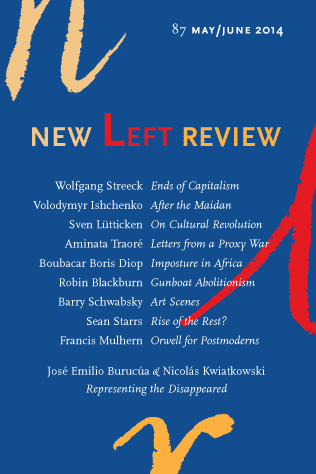Antecedents and aftershocks of the Maidan protests. A Ukrainian sociologist discusses the riven political and ideological landscape laid bare by the fall of Yanukovych, and the tensions being stoked in the country’s east by Russian interference and Kiev’s ongoing military assault.
Its challengers apparently vanquished, the main threat to capitalism may now come from disorders that lurk within the system itself. Wolfgang Streeck diagnoses its crisis symptoms, from persistent stagnation to global anarchy, and asks what lies in store as they multiply.
Exchanges between two West African intellectuals amidst the latest French incursion in the region, this time on Malian soil. The recurrent delusions of humanitarian warfare, and continued submission of local elites to Paris.
Has the rise of the BRICs weakened the West’s grip on core sectors of the world economy? Sean Starrs weighs impressions of Western decline against the empirical evidence, finding plentiful signs of enduring US and European corporate power.
What images arise when representation reaches its limits? Two cultural historians explore the emergence since classical antiquity of a series of visual devices for depicting massacres: from hunting scenes and martyrdoms to infernos and Doppelgänger.
Mutations of an untimely concept, in a period when capitalism has arrogated to itself the power of radical transformation. From Debord and Marcuse to the contemporary art world, by way of punk rock and hip hop.
Francis Mulhern on Rob Colls, George Orwell: English Rebel. The protean cult of Eric Blair finds its latest iteration.
Robin Blackburn on Richard Huzzey, Freedom Burning. Victorian Britain’s anti-slavery crusade as accomplice of imperial expansion.
Barry Schwabsky on Jacques Rancière, Aisthesis. Episodes from a history of modern art, from Winckelmann to Mallarmé to Vertov.
